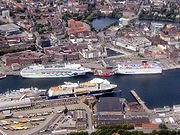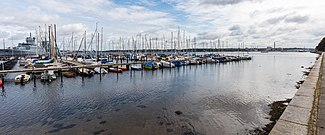Kiel
Kiel (German pronunciation:/ki memorial/(![]() listen)) is the most populous capital and city of the federated state of Schleswig-Holstein, the northernmost of the states of Germany. The city extends around Kieler Förde, one of the two sea languages of the Bay of Kiel, in the Baltic Sea, and has been one of the main German naval bases since the 1860s. Some of the most important shipyards in the country that manufacture military ships are in this city.
listen)) is the most populous capital and city of the federated state of Schleswig-Holstein, the northernmost of the states of Germany. The city extends around Kieler Förde, one of the two sea languages of the Bay of Kiel, in the Baltic Sea, and has been one of the main German naval bases since the 1860s. Some of the most important shipyards in the country that manufacture military ships are in this city.
The eastern entrance to the Kiel Canal is located on the western bank of the Kieler Förde, between the Kiel districts of Holtenau and Wik.
History
The city was almost completely destroyed by 710 American bombers on December 13, 1943, during World War II, so most of the buildings are new and give the city an industrial image.
Infrastructures
The Kiel Canal (Nord-Ostsee-Kanal in German), 45 m wide and 14 m deep, runs 96 km from Kiel to the mouth of the Elbe River.
The city has the largest shipyards in the country, including Howaldtswerke-Deutsche Werft, which manufactures the most modern non-nuclear submarines in the world. Such is the case of the U31 submarine, the first in the world with fuel cells.
Transportation
Port
In terms of passenger transport, Kiel is one of the most important ports in Germany. Every day ferry-cruises leave for Gothenburg and Oslo. In addition there are regular services to Lithuania and Saint Petersburg. During the summer, the port of Kiel is the departure point for cruises on the Baltic Sea.
Road
Kiel has very good communications with the rest of Schleswig-Holstein and Hamburg. Among the main roads, the motorways to the west (A210), south (A215/A7) and southeast (A21, under construction) stand out.
Railway
Kiel is the terminus of the main line from Hamburg, which was one of the first railways in Germany. In addition there are lines to the north (Flensburg), west (Rendsburg/Husum) and southeast (Lübeck).
Air transportation
Kiel has a small airport in the Holtenau district. A few years ago, there were regular flights to Frankfurt, Munich, Cologne-Bonn and Berlin, but due to the low demand and the too short runway that only allows the operation of small planes, at the moment there are only sports and military flights.
Education
The largest source of employment in the city is the public Christian Albrecht University (CAU). Founded in 1665, this institution receives support from the European Union to develop high-level research, such as the study of the composition of the Dead Sea Scrolls.
Sports
The most important event for the Kiel region is Kiel Week (Kieler Woche), which takes place in the last full week of June. It is, along with Cowes Week, one of the most important sailing competitions in the world and the largest popular festival in northern Europe.
Another team is Holstein Kiel that was about to be promoted to the Bundesliga, finishing third in the 2. Bundesliga where they played against 1. FC Köln, where they ended up falling. It is currently in the 2. Bundesliga, its stadium is the Holstein-Stadion.
In addition to the Kiel Yacht Club, other important sports clubs in the city are:
Twinned cities
- Brest (France, 1964)
- Coventry (United Kingdom, 1947)
- Gdynia (Poland, 1985)
- Kalingrad (Russia, 1992)
- Sovetsk (Russia, 1992)
- Stralsund (Germany, 1987)
- Tallinn (Estonia, 1986)
- Vaasa (Finland, 1967)
Notable people
Gallery
Contenido relacionado
Olvera
Bering strait
St. Petersburg








